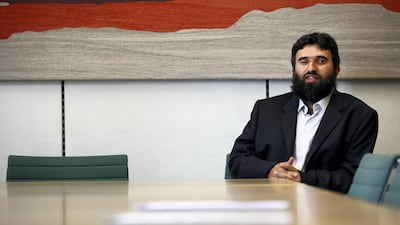A former Guantanamo Bay inmate detained because of his alleged links with Al Qaeda worked as an adviser for Libya’s oil sector.
Omar Deghayes, who campaigns on behalf of people still detained in the US detention centre, was director of legal affairs at Libya's Ministry of Oil and Gas and claimed to be a legal consultant for the National Oil Corporation, according to his LinkedIn profile.
The NOC did not respond to a request for comment but chairman Mustafa Sanalla told an analyst that Mr Deghayes did not advise them and was not paid by the NOC.
"Omar Deghayes was employed by the previous Ministry of Oil. He returned to the UK after that. He is not paid by NOC, nor does he advise anybody at NOC," according to Mr Sanalla in a message seen by The National.
Mr Deghayes disputed the claim and responded to further questions by posting an NOC-branded photographic identity card with his signature.
Mr Deghayes spent five years in the detention camp after being arrested in Pakistan in 2002. He had earlier fled Afghanistan following the fall of the Taliban after the 2001 US-led invasion.
The Libyan-born lawyer, 48, was freed in 2007 but left partially sighted after he said his eye was gouged by a camp guard.
_______________
Read more:
Lockerbie bomber's conviction to be reviewed
Tripoli bomb blasts deal major blow to Libya's election hopes
Libya's electoral commission in Tripoli rocked by suicide attack
_______________
Influence in the NOC is significant since the divided country’s economy hinges almost entirely on the oil sector, according to analysts.
Most of Libya’s oil resources lie in the east of the country, but former dictator Muammar Qaddafi moved the company’s headquarters to Tripoli. Benghazi, in the east of the country, now wants greater influence.
Rival factions based in Tripoli and the east have vied for power over the past four years, with some groups in the east making unsuccessful attempts to sell oil independently of Tripoli.
Libya’s oil production, which was crippled by conflict and blockades after 2013, partially recovered and last year reached more than one million barrels per day in 2017. Last month, the NOC was involved in discussions with BP and ENI over their planned return to Libya for oil exploration, according to a company statement.
Mr Deghayes would have been closely aligned to previous Libyan administrations, but he was no longer part of constituency that the NOC would have to please, said Claudia Gazzini, senior analyst for Libya at the International Crisis Group who received the message from Mr Sanalla.
The company was aware of his background, Mr Deghayes said on Saturday. "Guantanamo is not something that shames me," he wrote to The National. "Proud to have been a political prisoner … Draw your own conclusions why."
All sides in the divided country are aware of the need to ensure that the NOC can continue to operate unfettered by political feuding because of its economic importance to Libya, said Alison Pargeter, an independent Libya expert.
“As with so many things in Libya, therefore, neither side is strong enough to dominate fully, meaning that there is an uneasy balance between the competing powers over control of the energy sector.
“This has enabled the NOC to go about its business and, importantly, to retain its independence.”
Ian Walker, the managing director of London-based Middle East consultants MEC International, said the NOC’s day-to-day operations were run professionally but questions remained about transparency.
Mr Deghayes fled the country in 1986 after his father, a trade unionist, died in prison under the Qaddafi regime.
He settled in southern England and studied law before travelling to Afghanistan. He was detained in Pakistan after the downfall of the Taliban and was sent to the notorious detention centre in Cuba.
Mr Deghayes was released without charge in 2007 and was one of 17 detainees paid a total of £20 million by the UK government.
He last week won an apology from a British newspaper for suggesting that he used some of the money to pay his nephews to attend a gym where they had been radicalised. Two of the three nephews who travelled to Syria were later killed. In its apology, the Daily Telegraph newspaper accepted that Mr Deghayes was not responsible for his nephews travelling to Syria and agreed to pay damages and costs.
Following his release from Guantanamo, Mr Deghayes was immediately held after Spain launched an aborted prosecution claiming that he was part of an Al Qaida cell in the country. He was allegedly part of a group that helped send recruits to terrorist training camps in Afghanistan.
He was accused by the US of having direct links to Abu Qatada, a radical preacher described as Al Qaeda's "spiritual ambassador" in Europe, according to the Sunday Times in 2007.
The US said that he was “jihadi veteran” of the Bosnian war and was an associate of a leader of a dozen suicide bombers who killed 33 people in Casablanca, Morocco, in 2003.
His legal team claimed that Mr Deghayes was a victim of a US smear campaign and described the allegations against him as “absolute drivel”. They pointed out he was never charged with any offence before his release from Guantanamo.
Mr Deghayes is head of the legal section of the Guantanamo Justice Centre, founded by former prisoners to help those still inside and those that have been released.
“One of the many stigmas that are still carried by those who have been released is being constantly referred to as 'terrorists suspects' and yet none of the men who have been released have ever been charged with a crime nor were they convicted of any offence,” the group notes. “Trying to re-build a life with these kinds of stigmas is extremely difficult.”

